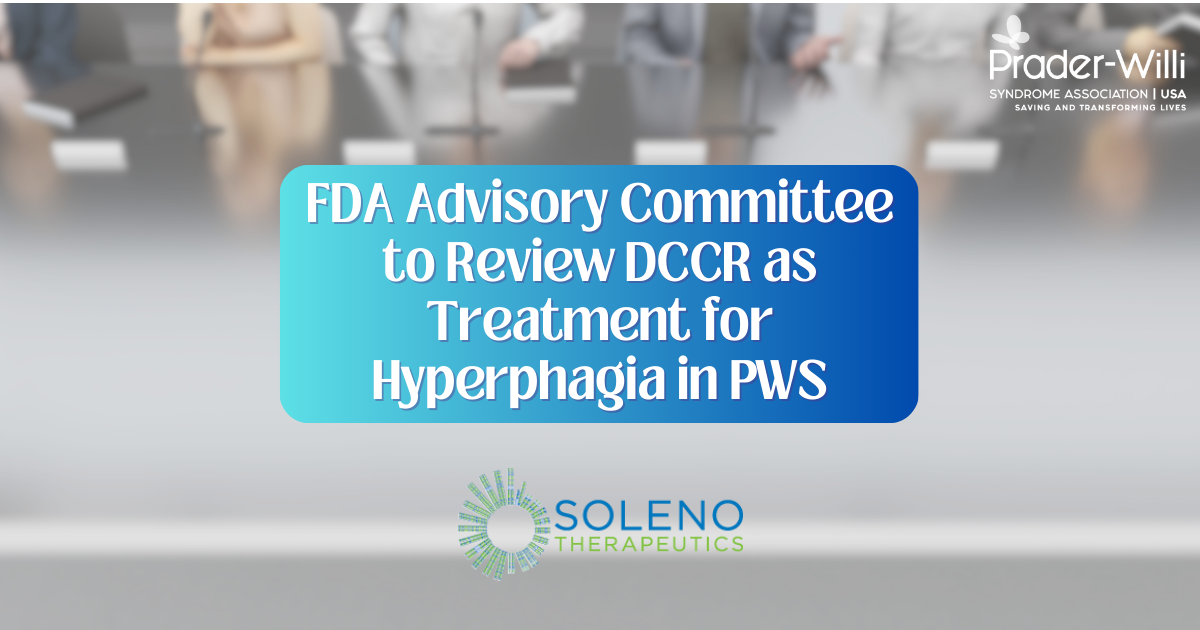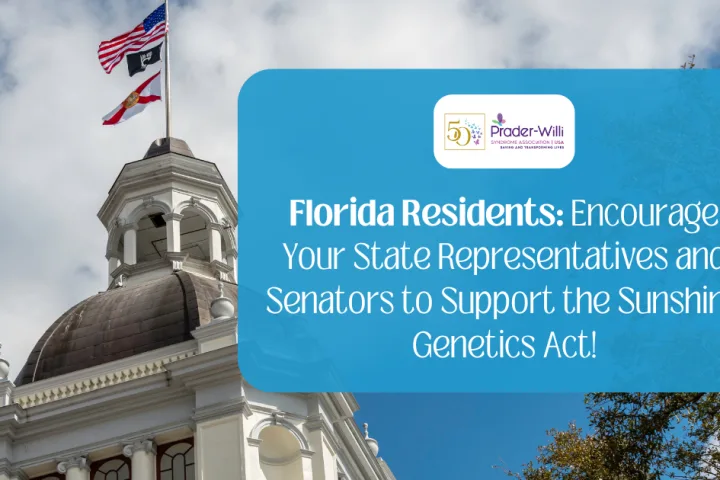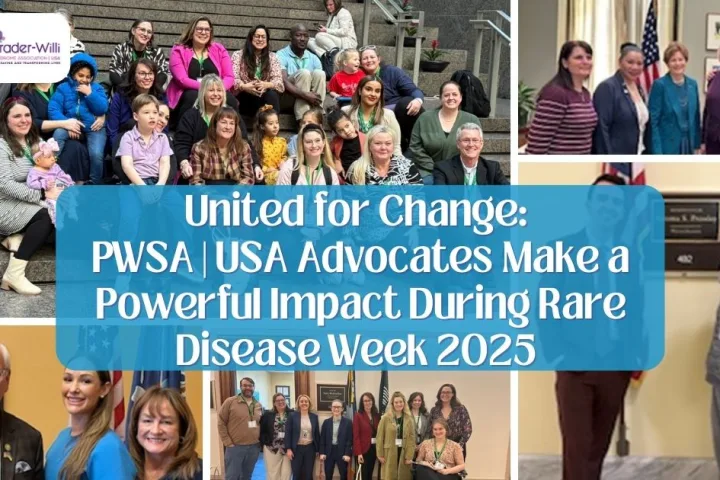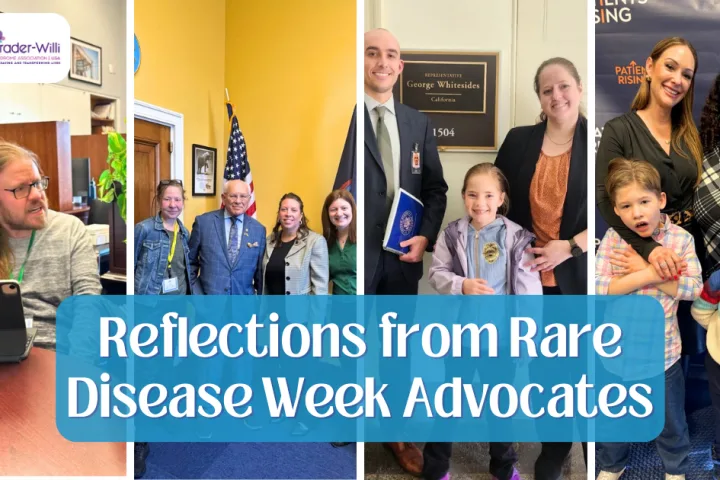The FDA has announced its plan to conduct an Advisory Committee Meeting as part of its review of Soleno Therapeutics’ DCCR New Drug Application. The FDA convenes Advisory Committees to provide independent expert advice that contributes to the agency’s regulatory decision-making. As part of the Advisory Committee Meeting, interested community members are encouraged to share their views. A date has not yet been announced for the meeting, but we expect it to be held toward the end of the review process, which has a target completion date of December 27, 2024.
Advisory Committee meetings are a critical step in the drug approval process, and the meeting for DCCR will provide the PWS community with an opportunity to speak directly to the FDA regarding the benefit DCCR can provide to our community.
What is an Advisory Committee?
Advisory committees provide independent advice and recommendations to the Food and Drug Administration (FDA) on scientific and technical matters related to the development and evaluation of products regulated by the Agency. Advisory committee meetings can occur during any stage of a medical products review process and after a product has been approved and marketed, but in this case the FDA is seeking input as it makes its final determination as to whether or not DCCR should be approved for treating PWS. Although the committees provide recommendations to the Agency, final decisions are made by FDA.
What will happen during the Advisory Committee meeting?
During the public meeting, the company sponsor, Soleno Therapeutics, presents its data, the FDA scientists present their review, and members of the public are invited to speak briefly during the “open public comment period.” Advisory committee members ask questions of the sponsor, the FDA, and occasionally individuals who speak during the open public comment period. At most advisory committee meetings, the majority of the research-based presentations are by the company and its paid consultants, with less time for presentations by FDA scientists. Outside experts, such as government researchers or independently funded researchers, are sometimes invited to make formal presentations at an advisory committee meeting, but such presentations are not typical.
After reviewing the data and listening to the company presentation, the FDA presentation, and any public comments, committee members discuss and vote on questions that the FDA has prepared and provided to committee members in advance. The prepared questions for new medical products include whether the product is effective, whether it is safe, and whether the
safety and effectiveness information submitted for the new drug is adequate for marketing approval.
Who can attend an Advisory Committee meeting?
Advisory Committee meetings are public and open to anyone who wishes to attend. They can be held online via teleconference or in person.
How can you participate in the Advisory Committee meeting?
Community members may provide written comments or request an oral presentation.
- · If you are a PWS community member but did not participate in the DCCR clinical trial, we encourage you to submit a written comment to the advisory committee. Instructions for how to submit your written comments will be provided when the meeting date is announced.
- · If your family has participated in the DESTINY-PWS clinical trial, you may be interested in sharing your experience with the committee through a short, oral testimony. We encourage community members interested in oral testimony to contact Susan Hedstrom at Susan.Hedstrom@FPWR.org or Stacy Ward at SWard@pwsausa.org. We will schedule 2-3 Zoom sessions to help prepare our community members who are selected to give oral testimony. Instructions for how to request time for oral comments will be provided when the meeting date is announced.
The oral comment period is generally limited to 1 hour. Depending on how many individuals sign up to speak, allotted times may range from 2-5 minutes. If more individuals request to speak than time allows, a lottery will be conducted by the FDA to determine who is invited to speak. An interested person who wishes to make an oral presentation during the Open Public Hearing portion of an advisory committee meeting should register with FDA before the meeting. Note that because speaking time is so limited, we encourage community members who do not have direct experience with DCCR to submit written comments rather than request a speaking slot.
Preparing for the Greatest Impact
FPWR and PWSA-USA are here to help you provide impactful testimony. If you are providing written comments, you may want to consider writing about the following topics:
- · Unmet need. PWS has a tremendous impact on the person with PWS and their family. It is a serious, life-threatening disorder and currently, we have no treatments to address the greatest challenges of PWS.
- · What would improvement mean to you? Modest improvements in key behaviors, like hyperphagia, rigidity or anxiousness, will have a meaningful impact on our loved ones with PWS. How might an approved treatment change the life of your loved one living with PWS?
- · Risk tolerance. Our kids live with risk every day – from the risk of death from hyperphagia to using medications that have not been tested specifically for people with PWS. Many in our community are willing to live with a degree of risk for the opportunity to try drugs that may make a meaningful impact.
- ·Willingness to accept uncertainty of BENEFIT. We recognize that not every drug will help EVERY person with PWS. DCCR has a favorable safety profile, and data Soleno’s clinical trials as well as a comparison with individuals from the Global PWS Registry has shown people with PWS who are taking DCCR have lower hyperphagia scores than people who are not.
If you participated in the DESTINY-PWS study, you may want to elaborate on one or more of the following:
- · How has DCCR changed your child’s relationship with food? Describe what your child’s food interest and hunger looked like before treatment. Could they delay meals or snacks, could they be a part of events where food was available? Did they talk or ask about food? How is it different now with treatment?
- · Describe your child’s anxiousness before beginning treatment. What did it look like? Tearful, angry, irritable, aggressive? What triggered it? How are things different now with treatment?
- · Have you seen any improvement in their metabolism or body composition?
- · What is the most important way DCCR has changed your loved one with PWS’s life? Has it allowed them to do things that they would not have been able to do before?
- · What is the most important way DCCR has changed your family’s life?
As we approach the Advisory Committee meeting, FPWR and PWSA-USA are committed to ensuring that the voices of our community are heard with the greatest impact. We will be actively supporting and preparing those who wish to share their experiences and perspectives, whether through written comments or oral testimony. Our collective goal is to advocate effectively for the approval of DCCR, emphasizing the potential it holds to significantly improve the lives of those living with PWS. Together, we will make sure that the FDA understands the real, tangible benefits this treatment could offer to our loved ones.
Share this!





 Jennifer Bolander has been serving as a Special Education Specialist for PWSA (USA) since October of 2015. She is a graduate of John Carroll University and lives in Ohio with her husband Brad and daughters Kate (17), and Sophia (13) who was born with PWS.
Jennifer Bolander has been serving as a Special Education Specialist for PWSA (USA) since October of 2015. She is a graduate of John Carroll University and lives in Ohio with her husband Brad and daughters Kate (17), and Sophia (13) who was born with PWS. Perry A. Zirkel has written more than 1,500 publications on various aspects of school law, with an emphasis on legal issues in special education. He writes a regular column for NAESP’s Principal magazine and NASP’s Communiqué newsletter, and he did so previously for Phi Delta Kappan and Teaching Exceptional Children.
Perry A. Zirkel has written more than 1,500 publications on various aspects of school law, with an emphasis on legal issues in special education. He writes a regular column for NAESP’s Principal magazine and NASP’s Communiqué newsletter, and he did so previously for Phi Delta Kappan and Teaching Exceptional Children. Evan has worked with the Prader-Willi Syndrome Association (USA) since 2007 primarily as a Crisis Intervention and Family Support Counselor. Evans works with parents and schools to foster strong collaborative relationships and appropriate educational environments for students with PWS.
Evan has worked with the Prader-Willi Syndrome Association (USA) since 2007 primarily as a Crisis Intervention and Family Support Counselor. Evans works with parents and schools to foster strong collaborative relationships and appropriate educational environments for students with PWS. Dr. Amy McTighe is the PWS Program Manager and Inpatient Teacher at the Center for Prader-Willi Syndrome at the Children’s Institute of Pittsburgh. She graduated from Duquesne University receiving her Bachelor’s and Master’s degree in Education with a focus on elementary education, special education, and language arts.
Dr. Amy McTighe is the PWS Program Manager and Inpatient Teacher at the Center for Prader-Willi Syndrome at the Children’s Institute of Pittsburgh. She graduated from Duquesne University receiving her Bachelor’s and Master’s degree in Education with a focus on elementary education, special education, and language arts. Staci Zimmerman works for Prader-Willi Syndrome Association of Colorado as an Individualized Education Program (IEP) consultant. Staci collaborates with the PWS multi-disciplinary clinic at the Children’s Hospital in Denver supporting families and school districts around the United States with their child’s Individual Educational Plan.
Staci Zimmerman works for Prader-Willi Syndrome Association of Colorado as an Individualized Education Program (IEP) consultant. Staci collaborates with the PWS multi-disciplinary clinic at the Children’s Hospital in Denver supporting families and school districts around the United States with their child’s Individual Educational Plan. Founded in 2001, SDLC is a non-profit legal services organization dedicated to protecting and advancing the legal rights of people with disabilities throughout the South. It partners with the Southern Poverty Law Center, Protection and Advocacy (P&A) programs, Legal Services Corporations (LSC) and disability organizations on major, systemic disability rights issues involving the Individuals with Disabilities Education Act (IDEA), Americans with Disabilities Act (ADA), and the federal Medicaid Act. Recently in November 2014, Jim retired.
Founded in 2001, SDLC is a non-profit legal services organization dedicated to protecting and advancing the legal rights of people with disabilities throughout the South. It partners with the Southern Poverty Law Center, Protection and Advocacy (P&A) programs, Legal Services Corporations (LSC) and disability organizations on major, systemic disability rights issues involving the Individuals with Disabilities Education Act (IDEA), Americans with Disabilities Act (ADA), and the federal Medicaid Act. Recently in November 2014, Jim retired.